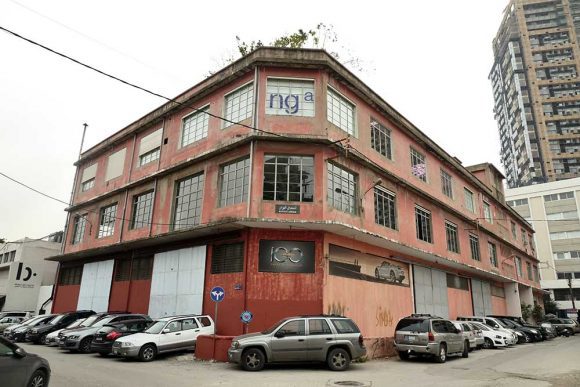 Ashkal Alwan
Ashkal Alwan


Founded in 1994, Ashkal Alwan—the Lebanese Association for Plastic Arts is a non-profit organisation based in Beirut, Lebanon. Meaning ‘forms and colours’ in Arabic, it was incepted informally in 1993 as a network of artists, educators, writers, activists, and cultural practitioners in Beirut. Following the Lebanese Civil War (1975-1990), artists and thinkers came together to reclaim Beirut through communal intellectual endeavors and artistic interventions in public spaces. As such, it was formally established a year later by Christine Tohmé (Curator), Marwan Rechmaoui (Artist), Rania Tabbara (Graphic Designer and Interior Designer), Mustapha Yamout (Cultural Events Organizer) and Leila Mroueh (Communications Director). Ever since its launch, the association has been committed to support and nurture contemporary practices, production, research, and education.
Sandwiched between large-scaled warehouses of car dealerships and factories, the building operates as a platform for contemporary artists and cultural practitioners globally. In 2011, the founding director Christine Tohmé initiated the ‘Home Workspace’ pedagogical programme that initially emerged from ‘Home Works Forum’ (HWF) which was launched in 2002. The latter is a bi-annual and tri-annual platform conceived as an unconventional art school designated for cultural practices, with a duration of ten months. Ashkal Alwan’s programmes are led by artists such as Emily Jacir, Walid Raad, Khalil Rabah, and Lina Saneh who design the curriculum, as well as assign speakers to deliver lectures, masterclasses, and workshops to emerging artists. In total, the programmes accept fifteen students a year.
In addition to educational programmes, residencies, conferences, festivals, lectures, and workshops, Ashkal Alwan also offers a library with a unique collection of books, catalogues, periodicals, and media materials dedicated to contemporary artistic, cultural, and textual practices in Lebanon, the region, and the world. Ashkal Alwan’s main mission is to build networks of exchanges between artists, cultural practitioners, and institutions. Similarly, it aims to document and archive artistic and intellectual endeavors in Lebanon and the region. Through their extensive educational programmes and workshops, it aims to support emerging and established artists by providing resources for the expansion of ideas and work, enrich critical discourse in the Arabic language, in addition to providing support for independent initiatives working in and around the civic and political realms.


 Ashkal Alwan
Ashkal Alwan 
